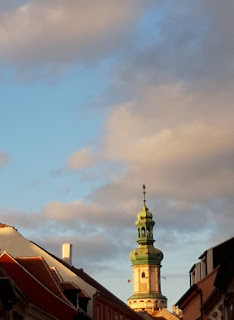Szombathely, 26 October 2021
When approaching the shopping centre in Szombathely, a flock of birds takes off from a nearby roof and starts its rounds. These birds do it for me, of course, and I try to photograph them but they are too quick - I can't catch them. The same with life - it's mostly too quick for me. Only in hindsight do I know what I should have done.
I started my Hungarian week in Sopron, a place I know from previous visits (nobody in the hotel is wearing a mask despite the info to the contrary on the hotel's website - I feel uncomfortable and avoid contact as much as possible), and then proceeded to Debrecen, the second-largest city of the country, situated in the Northern Great Plain region - hailing from a mountainous country, I do love plains!
Only some elderly people and the occasional Asian are wearing masks - if ignorance were truly bliss, the Hungarians would look happier. In the stores, I put on a mask and from time to time get a hostile look.
The woman who tends the bar in my hotel is in her thirties and had worked in different locations, among them Dallas. She's fond of the American way of working - people care, she says, in Hungary, according to her, nobody gives a shit. And, while I'm in no position to judge that, the room cleaning lady is clearly a case in point - she pretends to not understand the 'please clean the room'-sign (in Hungarian).

Debrecen, 24 October 2021
The receptionist says she does not remember how she ended up in her hotel job but she's now been doing it for six years and loves it.
The old lady (older than me) on the train from Budapest to Szombathely tells me of her aunt who's 104 and wants to go but can't, and of Gershwin who died aged 39 because of a brain tumour.
Since the ride takes 2 1/2-hours and the lady happens to be a curious person, I let her know my theory of life (my strength is in theories not in practice) to which she eventually says: It's probably not easy to find people who go along with it. Well, experience in a psychiatric clinic certainly helps, I reply.
And, then there is of course also the occasional mutual physical attraction that I however did not mention while remembering the exchange of looks between the tall blonde and me at Debrecen train station a few hours ago.
Sopron, 22 October 2021
Travelling means to find yourself deprived of your usual routines. It is a way of freeing yourself up and while this is not always comfortable, it can be rewarding. The two major benefits that I experienced during my Hungarian week (away from my largely conditioned and safe life, that is) were the slowing down of time as well as a sense of vulnerability. The latter, I suppose, most people would probably not judge positively, to me, however, it felt enriching to become aware of how vulnerable I am, and we all are – a most necessary lesson that can teach us how precious life is.
























